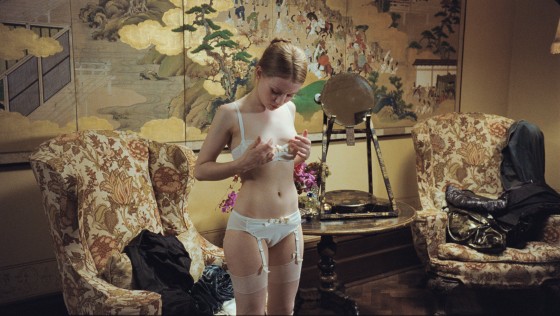 The female form is objectified and sexualized in Sleeping Beauty, the directorial debut of Australian novelist Julia Leigh. A modern, ostensibly feminist fairy tale, the film tells the story of Lucy (Emily Browning), a young university student struggling to make ends meet. She takes a variety of odd jobs – waitressing, photocopying, even medical guinea pigging, which foreshadows her later work – but still has trouble paying the rent – until she responds to an ad for an elite brand of prostitution. At first merely a scantily clad server at a private black-tie dinner party, Lucy eventually works her way up the corporate ladder to become the titular figure of the film: a drugged, naked girl which old rich men can do anything they want to – except penetration. Needing the money, Lucy sells her body and buries her shame, only briefly questioning her decision near the end; in general, though, this is not a film of character motivations and narrative progression.
The female form is objectified and sexualized in Sleeping Beauty, the directorial debut of Australian novelist Julia Leigh. A modern, ostensibly feminist fairy tale, the film tells the story of Lucy (Emily Browning), a young university student struggling to make ends meet. She takes a variety of odd jobs – waitressing, photocopying, even medical guinea pigging, which foreshadows her later work – but still has trouble paying the rent – until she responds to an ad for an elite brand of prostitution. At first merely a scantily clad server at a private black-tie dinner party, Lucy eventually works her way up the corporate ladder to become the titular figure of the film: a drugged, naked girl which old rich men can do anything they want to – except penetration. Needing the money, Lucy sells her body and buries her shame, only briefly questioning her decision near the end; in general, though, this is not a film of character motivations and narrative progression.
Taking cues from European art and American independent cinema, Leigh’s aesthetic is cold, restrained, and unshowy; it is also, however, rather boring. Utilizing mostly long shots and static camerawork, she depicts Lucy from a distance, reflecting the emotional dissociation she maintains in order to do what she does. Only occasionally zooming in for a rare close-up of her lead’s china-doll features, Leigh’s commitment to her art is admirable (especially for a first-time director), if uninteresting; really, she does very little with her camera, portraying Lucy's shallow life with hollow style and easily read meaning. I suppose that’s kind of the point, but I wasn’t sold by the approach, nor the effect. It’s a fairly plain film, despite the risqué content.
As Lucy, Emily Browning is similarly icy and reserved. Although viewers who felt blue-balled by this year’s earlier cock-tease Sucker Punch will no doubt be satisfied by her plentiful nudity, there’s not a lot else to her performance. Again, this may be said to fit the empty existence of the main character, as well as Leigh’s overall aesthetic approach, but I merely found her flat (in more than one way) and wooden. There’s a strange sort of subplot involving Lucy and a man named Birdmann, a perpetually ill individual who apparently pays for her companionship (I’m still perplexed on what exactly went on or what the point was), in which the two act overtly courteous and formal to each other. This would seemingly allow Browning to express herself and break from her glassy exterior, but she remains superficial throughout. Perhaps this is a conscious decision by the actress or the director – or perhaps she’s just not a very good thespian. In any case, I didn’t buy it.
Leigh is obviously making a feminist point – criticizing the men who pay for prostitution and the patriarchal system that forces women to turn to such means – but her approach is so weak and watered-down that it hardly registers. True, I’m no fan of heavy-handed posturing or didactic lecturing, but surely there must be a way to convey your message in a subtle yet effective fashion. There’s no doubt of the film’s subtlety, but it’s restrained to the point of ineffectuality; all the long shots in the world won’t help you if you can’t say something of substance. And that’s primarily my problem with this – despite its clear aspirations for art, and admittedly impressive (at times) aesthetic consistency, it’s ultimately an empty, hollow experience. Much like visiting a hooker.

